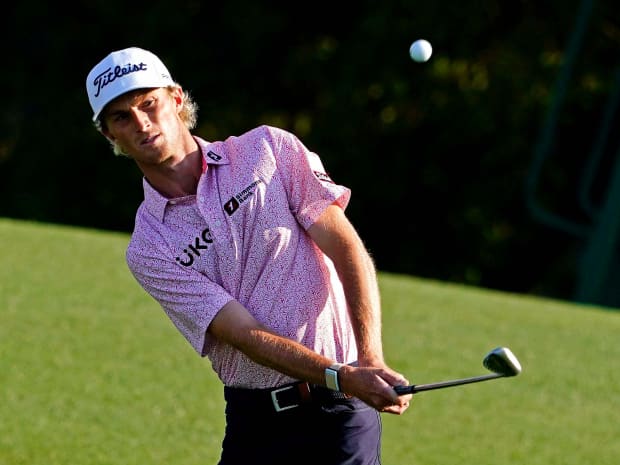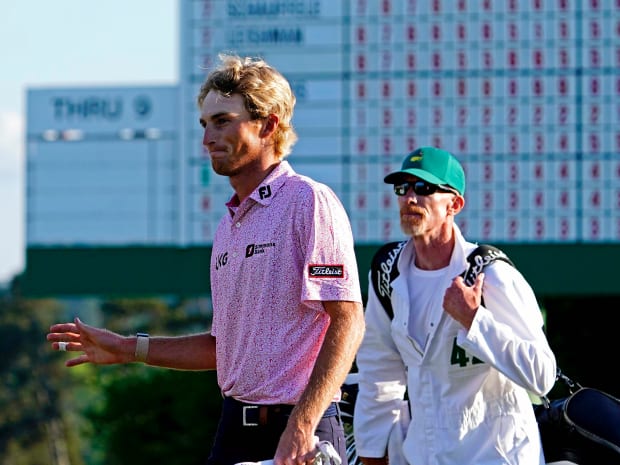Not long ago, the Masters runner-up was clawing for his professional life. His road to Augusta featured a failed developmental school stint, Taco Bell and some rounds with Tony Romo.
Will Zalatoris, the rosy-cheeked beanpole who looks more like Happy Gilmore’s caddie than a pro golfer, charmed media and fans alike this week with a line about his chances at the Masters: “If I'm stupid enough to think I can play here, then I'm stupid enough to think I can win it.”
His friend and frequent playing partner Kevin Dougherty has been turning that comment over in his head for the past few days, and he still doesn’t quite understand it. Of course Zalatoris could win at Augusta. Indeed, Dougherty spent the days leading up to the event telling anyone at Dallas’s Maridoe Golf Club who would listen to put money on Zalatoris.
“Honestly,” Dougherty says, “He’s been playing the best and most consistent out of everyone in the world.”
In the end, Zalatoris, 24, fell just short of his first green jacket: 2 under par for the day and 9-under for the week to finish in second place, one stroke back of Hideki Matsuyama. Zalatoris finished second in the field in greens in regulation. He demonstrated an unusual level of poise. He promised to do better soon.
He still has not won a PGA Tour event, but he said afterward, “The first one’s coming.”
This week, Zalatoris announced himself as a future star. But first he had to save his career by playing badly—twice.

Will was six when Ken Venturi, the 1964 U.S. Open champion, spotted him at the California Golf Club driving range and showed him an overlapping grip. He was nine when his parents, Cathie and Rick, moved from San Francisco to Dallas so their son could play in more competitive junior events. He was 12—“a little wee guy” who sometimes couldn’t even muscle the ball out of the rough, says David Price, his first and most important golf mentor—when he qualified for the 2009 U.S. Amateur.
And he was 16 when he began scuffling badly enough that most colleges stopped recruiting him. Zalatoris had been the shortstop on the baseball team and the point guard on the basketball team. He was an exceptional athlete, which turned out to be the problem.
“When you're such a good ball striker, you feel like you can do anything with any shot, and it's kind of a paradox of choice,” says Scott Fawcett, who began working with Zalatoris on course management in 2014. “He just was trying to do way too much on every single shot, trying to force birdies. He would have some crazy scorecards with six birdies, an eagle, two doubles and the rest bogeys to shoot even par.”
Fawcett caddied for him at the Texas Amateur that year. “If you do what I tell you to do, I guarantee you’ll win,” he promised. Zalatoris agreed. Focus on making fewer bogeys, Fawcett told him. You’re good enough that the birdies will take care of themselves. Fawcett identified targets other than the flag. Zalatoris fired at them. He shot 10 under par for the weekend and won by three strokes.
“You've given me 25 years of experience in 5 days,” Zalatoris texted him afterward. Fawcett was touched enough at the time that he named his coaching company Decade, after the idea that he could lop years off of a student’s learning curve. But now he sees something different in the message.
“Looking back at it, I'm like, This is a kid that is so beat-down that just one good round had him through the moon,” says Fawcett.
Six years later, he scuffled again. He had played on the 2017 Walker Cup team and left Wake Forest a semester early to turn professional, but he did not make it through Korn Ferry Tour qualifying school. He and his coaches began discussing which mini-tour events he could play. He spent more than a year struggling through Monday qualifying rounds, clawing every week for his professional life. He watched as Walker Cup teammates Cameron Champ, Doug Ghim, Maverick McNealy, Collin Morikawa, Doc Redman and Scottie Scheffler advanced to the PGA Tour.
“Even if I wasn't playing at their level, I knew I was capable of doing what they were doing,” Zalatoris said on Sunday. This time, he did what all golfers have to do when they struggle: He kept grinding. He gained Korn Ferry Tour status in July 2019. A year later, he won the Korn Ferry Tour’s TPC Colorado Championship, which qualified him for the U.S. Open.
“Once he had a set schedule, it was like a tidal wave,” says Dougherty.
The pandemic closed practice facilities, but it did not close Maridoe; he carried his bag and played almost daily with Dougherty and Davis Riley, who both compete on the Korn Ferry Tour. They were sometimes joined by Tony Romo. The layoff, Dougherty and Riley explain, helped them all focus more on playing golf rather than playing golf shots. Zalatoris especially seemed to find his stroke; one day he broke the course record, and the next day he broke it again.
He finished tied for sixth at the U.S. Open, which helped bump him to top-50 in the world, qualifying him for the Masters. He is still not a full member of the PGA Tour.
Those brutal Korn Ferry Mondays set Zalatoris up for his sparkling Masters Thursday through Sunday. Every round in his early professional days felt fraught; Augusta just felt exciting.
“I've been playing with house money,” he said on Thursday. “Basically every week is either win or just keep having the status that I have, whatever that is, so it's just been so fun.”

Zalatoris expected to be more anxious than he was. He had imagined playing here ever since he was an 8-year-old watching at Vivace, an Italian restaurant south of San Francisco, and he heard the roar when Tiger’s chip on No. 16 dropped in. He grew up alongside the children of Lanny Wadkins, who finished third here three times in the 1990s; Zalatoris still remembers idle comments Wadkins made a decade ago about the wind on No. 12. This week, Zalatoris made sure to look back every time he crossed the Hogan Bridge.
“I wanted to be here my entire life,” he said on Friday. “Some people shy away from that, but I'm excited to be here. I've wanted to be here forever. There's no reason to feel intimidated now. I made it to here. And obviously the job is not done by any means, but I think standing on the first tee and hearing your name called, that's something that every kid dreams of. And, you know, the first tee shot, of course I was pretty nervous, but the fact that I wanted to be here my entire life actually almost frees me up.”
His friends did not worry about jinxing him as the week progressed. On Saturday night, after Zalatoris’s 71 placed him four back of Matsuyama, Dougherty texted him a reference to the winner’s menu choice at the annual Champions Dinner: “Go ball out tomorrow and then 2022 is going to be catered Taco Bell.”
“You’re the third person that has talked to me about Taco Bell Champions Dinner,” Zalatoris replied. “I obviously need to work on my diet.”
There will be no Chalupa Supremes at next year's Champions Dinner. But you can expect Will Zalatoris to arrive in Augusta that week hungry to improve on his second-place finish.